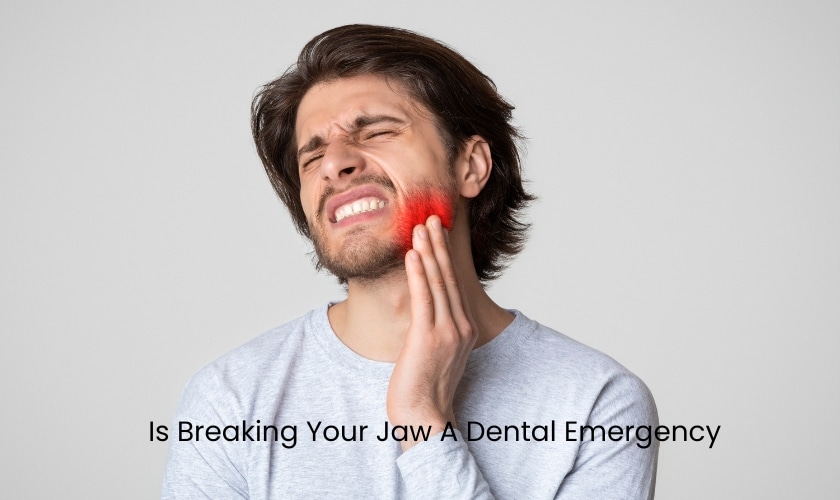
Is Breaking Your Jaw A Dental Emergency?
Your jaws are hurting? Breaking your jaw may not be the most pleasant experience, but it definitely falls under the category of a dental emergency. It’s like crashing a wild party thrown by your teeth (except nobody sent you an invite) and now your jaw’s RSVP is a resounding crack! Imagine you’re chomping down on your favorite snack, maybe trying to your destiny with impeccable chewing skills when suddenly – Snap! Your jaw decides to make its best impression of a broken zipper.
Cue the panic, the confusion, and the sudden realization that slurping soup might be your only option for the foreseeable future. If you’re facing this dental debacle, then reaching out to an emergency dentist in Union should be your next move for swift and expert care. So, buckle up (or maybe not, if your jaw is broken) as we enter the encyclopedia of jaw-dropping emergencies!
Understanding Jaw Fractures
Jaw fractures are often referred to as a broken jaw, and can result from various causes such as trauma, accidents, or medical conditions. Understanding the signs, symptoms, and treatment options for a broken jaw is a must for the right diagnosis and influential management.
What constitutes a broken jaw?
Have you ever thought about which reasons are responsible for a broken jaw? Here are they and how they can impact both your oral health and welfare.
- A broken or fractured jaw occurs when the jawbone, also known as the mandible, sustains a crack or break.
- This can lead to several causes including accidents, sports injuries, physical altercations, or medical conditions like osteoporosis.
Signs and Symptoms
Detecting the red flags behind a broken jaw is a must for timely medical assistance and to put a stop to further complications. Have a look at the telltale signs & symptoms that tell your jaws require an emergency dentist in Union for immediate evaluation and treatment.
- Severe pain around the jaw area, particularly when moving it or trying to speak.
- Swelling, bruising, or tenderness around the jaw or face.
- Difficulty opening or closing the mouth, or experiencing a misaligned bite.
- Numbness or tingling in the lips or chin, indicating possible nerve damage.
Assessing The Severity
Assessing the severity of a broken jaw is paramount when determining if it constitutes a dental emergency. Know the indicators that signal your jaw necessitates immediate dental intervention.
- Minor fractures may involve a small snap in the bone, leading to stiffness but not necessarily hindering basic jaw functions.
- Severe injuries, on the other hand, can cause significant pain, difficulty chewing or speaking, and may even result in the inability to fully open or close the mouth.
- Untreated fractures can lead to complications such as infection, malocclusion (misaligned bite), or delayed healing.
- Severe fractures may also pose risks to nearby structures like the teeth, gums, and nerves, requiring the right medical attention to prevent long-term damage.
The Role Of Dental Emergency Care
Dental emergency care plays a critical role in addressing urgent dental issues, including potential jaw fractures. Knowing whether breaking your jaw constitutes a dental emergency is vital for swift and appropriate treatment.
- Instant response: Breaking your jaw typically qualifies as a dental emergency, necessitating prompt evaluation and treatment.
- Immediate medical attention: Seeking immediate dental attention is essential to assess the extent of the injury and alleviate soreness.
Diagnostic Procedures
Dental professionals may utilize various diagnostic tools such as X-rays, CT scans, or MRI scans to visualize the extent of the fracture and identify any associated injuries.
Clinical examination and palpation of the jaw and surrounding tissues help in determining the severity of the fracture and planning an appropriate treatment.
Conservative Management
Treatment Options
The realm of conservative management options offers confirmation of the urgency of a broken jaw as a dental emergency. By prioritizing non-surgical techniques to stabilize and facilitate healing, these approaches provide invaluable insights into the importance of prompt dental care. This blog unravels the pivotal role of conservative management.
- Serious fractures may be managed conservatively with techniques such as immobilization (using a jaw wiring or splint) to stabilize the jaw.
- Pain management strategies including analgesics and anti-inflammatory medications, help overcome unease and reduce swelling.
Surgical Intervention
- Severe fractures or those involving displacement of the bone segments may require surgical intervention to realign the jaw and safeguard the fragments with plates, screws, or wires.
- Oral and maxillofacial surgeons specialize in performing such procedures and ensuring optimal outcomes for patients with complex jaw fractures.
Recovery & Rehabilitation
Follow-Up Care
Regular follow-up appointments with the dentist or oral surgeon are mandatory to monitor the healing progress, remove any fixation devices, and address any concerns. Dietary modifications, such as consuming soft foods or liquids may be recommended during the initial phases of recovery to prevent strain of the jaw.
Physical Therapy
Rehabilitation exercises are focused on jaw mobility, strength and range of motion may be prescribed to aid in restoring normal function and preventing joint dysfunction. Patient education regarding proper oral hygiene practices and lifestyle modifications can promote optimal recovery and minimize the risk of future injuries.
In conclusion, breaking the jaw warrants immediate medical care and intervention. Assistance from an dentist in Union should be your first priority as timely evaluation by dental professionals is crucial for accurate diagnosis and appropriate. By adhering to the recommended treatment plan, individuals can regain normal health.





